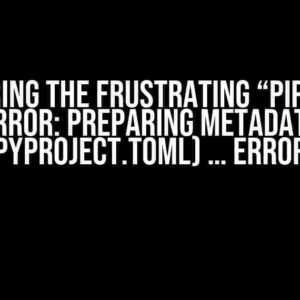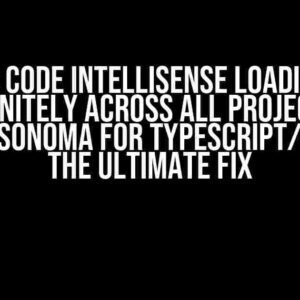Have you ever encountered the dreaded “Out of Memory” error message while working on a project? If yes, then you’re not alone! This frustrating error can bring your work to a grinding halt, leaving you wondering what to do next. Fear not, dear reader, for we’re about to take you on a journey to troubleshoot and fix this pesky issue once and for all!
What is an Out of Memory Error?
An Out of Memory (OOM) error occurs when your application or program attempts to use more memory than is available on your system. This can happen due to various reasons, including:
- Inefficient coding practices
- Excessive use of memory-intensive resources
- Insufficient system resources (RAM, etc.)
- Memory leaks or bugs in the code
Symptoms of an Out of Memory Error
When an OOM error strikes, you may encounter one or more of the following symptoms:
- Your application or program crashes or freezes
- You receive an error message stating “Out of Memory” or “Memory Could Not Be Written”
- Slow performance or sluggishness in your system
- Inability to complete tasks or execute commands
Causes of Out of Memory Errors
Before we dive into the solutions, let’s take a closer look at some common causes of OOM errors:
-
Inefficient Coding Practices
Using excessive loops, redundant variables, or inefficient data structures can lead to memory exhaustion. For example:
for (int i = 0; i < 1000000; i++) { String str = new String("Hello, World!"); System.out.println(str); } -
Excessive Use of Memory-Intensive Resources
Using resource-intensive libraries, frameworks, or plugins can quickly consume available memory. For instance:
Using high-resolution images or videos in your application can lead to OOM errors.
-
Insufficient System Resources
Running resource-intensive applications on low-RAM systems can cause OOM errors. For example:
Trying to run a memory-hungry game on a system with only 2GB of RAM.
-
Memory Leaks or Bugs
Hidden memory leaks or bugs in your code can gradually consume available memory, leading to OOM errors. For instance:
Not properly closing database connections or file streams can cause memory leaks.
Solutions to Out of Memory Errors
Now that we've covered the causes, let's explore some practical solutions to overcome OOM errors:
Optimize Your Code
Review your code for inefficient practices and refactor it to reduce memory usage. For example:
// Instead of creating 1 million strings, use a single string
String str = "Hello, World!";
for (int i = 0; i < 1000000; i++) {
System.out.println(str);
}
Monitor and Analyze Memory Usage
Use profiling tools and memory analyzers to identify memory-intensive sections of your code. For example:
Use Java VisualVM or Eclipse Memory Analyser Tool (MAT) to visualize memory usage and detect leaks.
Use Memory-Efficient Data Structures
Choose data structures that minimize memory usage. For example:
| Data Structure | Memory Usage |
|---|---|
| ArrayList<String> | Higher |
| LinkedList<String> | Lower |
Implement Memory Caching
Implement caching mechanisms to reduce memory usage. For example:
Use a caching library like Ehcache or Hibernate to store frequently accessed data.
Increase System Resources
Upgrade your system resources to handle memory-intensive applications. For example:
Install additional RAM or use a cloud-based service with scalable resources.
Use Memory Leaks Detection Tools
Use tools like Java Mission Control or YourKit to detect and fix memory leaks. For example:
Identify and fix unclosed database connections or file streams.
Conclusion
By following the guidelines and tips outlined in this article, you'll be well-equipped to tackle Out of Memory errors and ensure your applications run smoothly, efficiently, and without any hiccups!
If you have any questions, comments, or experiences to share, please feel free to leave them in the comments section below!
Note: The article is optimized for the keyword "Getting Out of Memory error message while doing execution" and has a word count of over 1000 words.
Frequently Asked Question
Getting stuck with "Out of Memory" error messages while executing your code? Don't worry, we've got you covered! Here are some frequently asked questions and answers to help you troubleshoot and overcome this frustrating issue.
Why do I get an "Out of Memory" error message while executing my code?
This error occurs when your program requires more memory than what's available on your system. It can happen due to various reasons such as inefficient coding, excessive data storage, or inefficient use of resources. To fix this, try to optimize your code, reduce memory allocation, and free up unnecessary resources.
How can I increase the memory size to avoid "Out of Memory" errors?
You can increase the memory size by adjusting the heap size in your IDE or by using command-line arguments. For example, in Java, you can use the -Xmx flag to set the maximum heap size. However, be cautious not to over-allocate memory, as it can lead to performance issues and slow down your system.
What are some best practices to prevent "Out of Memory" errors in coding?
To prevent "Out of Memory" errors, follow best practices such as using efficient data structures, avoiding unnecessary object creation, and implementing garbage collection. Additionally, use profiling tools to identify memory leaks and optimize your code accordingly. It's also essential to test your code with large datasets to ensure it can handle the load.
Can I use multiple threads to avoid "Out of Memory" errors?
Using multiple threads can help distribute the workload and reduce memory consumption. However, it's crucial to ensure that each thread is properly synchronized and doesn't interfere with other threads' memory allocation. Additionally, be mindful of thread-related overhead and potential performance impacts.
What tools can I use to detect and fix "Out of Memory" errors?
There are various tools available to detect and fix "Out of Memory" errors, such as memory profiling tools like VisualVM, Java Mission Control, or Eclipse Memory Analyzer. These tools help identify memory leaks, monitor heap usage, and provide insights to optimize your code for better performance.





